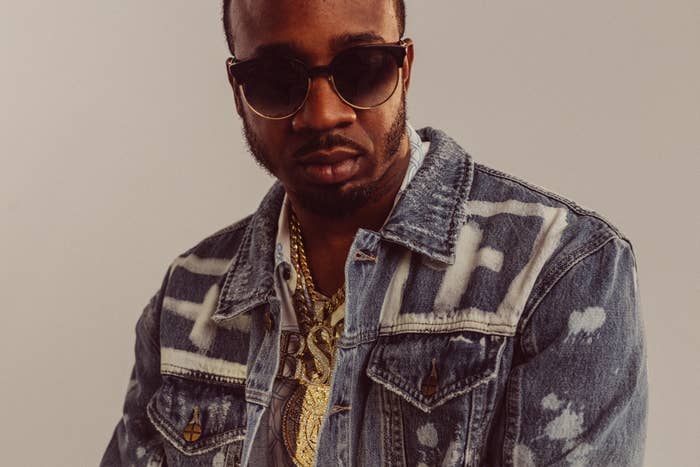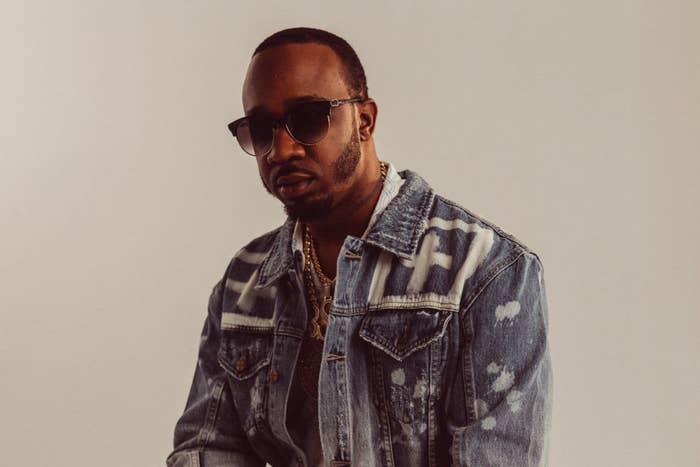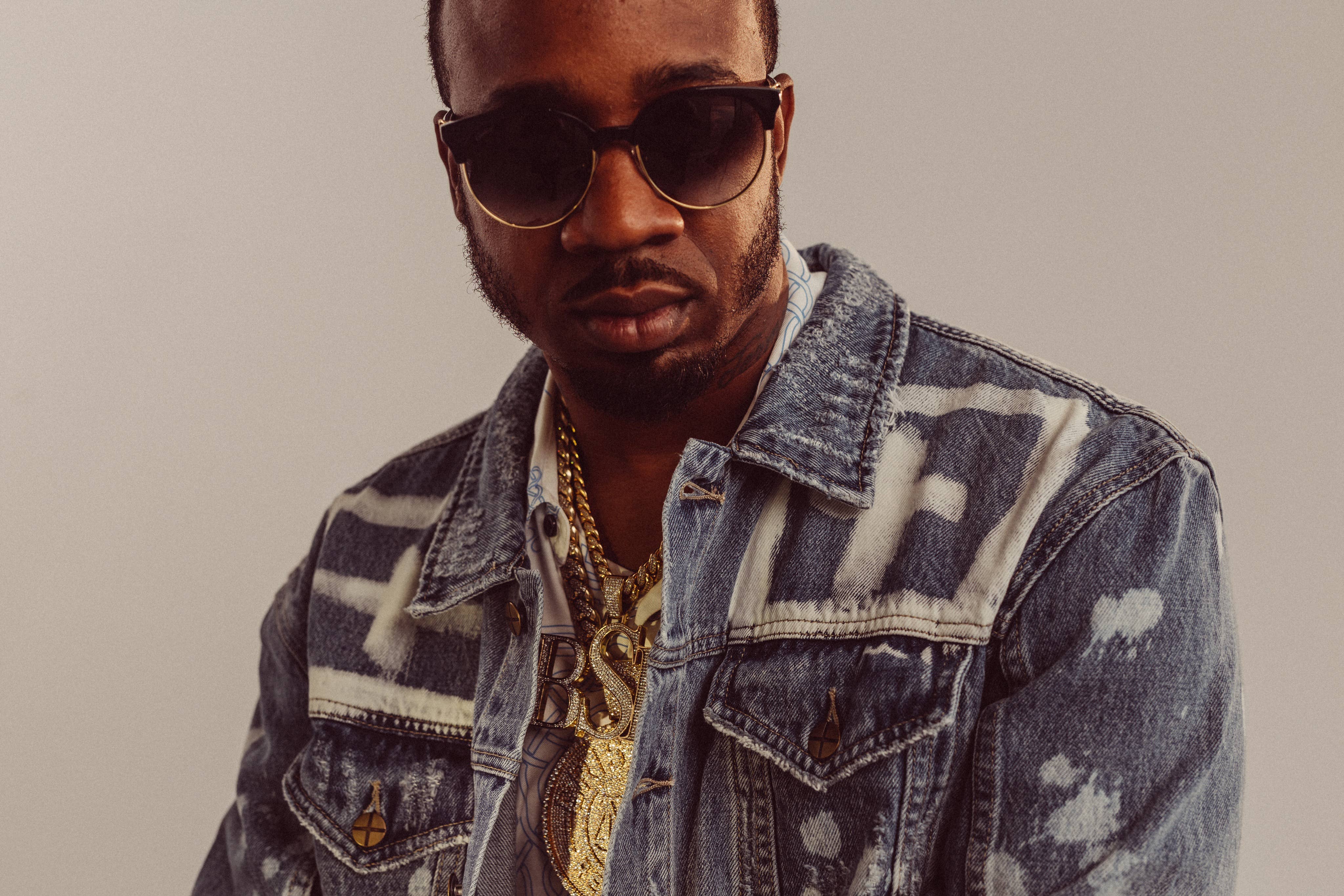
Jeremie Pennick knows he has something to prove.
There’s a reason that the veteran Buffalo rapper known professionally as Benny the Butcher named his new album Burden of Proof. After years of grinding, releasing mixtape after mixtape (and being interrupted by occasional stints behind bars), Benny’s star has risen in recent years, alongside his cousins Westside Gunn and Conway the Machine. Those three form the core of the Griselda crew, whose mix of rugged beats, tough talk, and high art references has been one of the greatest hip-hop success stories of the past decade.
Burden of Proof is, well, proof of Benny’s rise. In addition to being fully produced by Hit-Boy, the album contains features from stars like Rick Ross, Lil Wayne, and Big Sean. "I'm telling people, 'I'm a legend now,'" he tells Complex. "I'm trying to prove that with these albums, with the work that I'm putting in, with the legacy I'm leaving. That's what the whole album is about."
This week, before the October 16 release of Burden of Proof, we got on the phone with Benny to talk about his past, present, and future (and how much money he’s making in merch, even during a pandemic). But we began by remembering his longtime friend and mentor, Demetrius “DJ Shay” Robinson. DJ Shay was a Buffalo rap impresario who played a number of roles in Benny’s career, from label head to manager to producer. He died this past August of complications from COVID-19. The conversation, lightly edited for clarity, is below.

I wanted to begin by talking about DJ Shay. What's your first memory of him?
I remember seeing him run around, doing his shit around the town. Shay was a Buffalo legend.
When did you first meet him?
One of my guys was re-recording music that we already did, and he was using Shay's studio. I went over to Shay's studio and I recorded it. That's the first time Shay heard me rap. Me and him have been cliqued ever since.
What role did he play in your career, and how did that change over time?
I was signed to his label [Buff City], first and foremost. He was my manager at a time. He was everything at a point in time. But mostly, as a producer, that's when we had the most chemistry. Everything was built off of that. Then as I grew in my career and I got my own company, he was basically the producer of everything. He was like a mentor. He was like a coach. He played a whole lot of roles.
A couple of months on from his death, how are you doing personally?
Man, I'm fucked up over it. Sometimes I want to pick up the phone and call him, and I can't. Sometimes I might get a new photo back that I'm using for the album or I might get a new video back and I can't go show him. It's hard experiencing all of this without him.
You've been releasing projects since 2004. What's different about Burden of Proof?
It's my whole project with Hit-Boy. The feeling is going to be different. I'm speaking about things I never spoke about on here. My confidence is different. My angle is different. It's still me, but I discovered new things in the process of writing this album. I'm at a different level. I'm thinking a whole different way.
"I'm telling people, 'I'm a legend now.' I'm trying to prove that with these albums."
There's a lot of autobiographical stuff on here—more than we’ve heard from you before. Why do you think that that happened this time out?
Because we're getting further in the book. We're getting further and deeper in the story. Other things are coming out, and it's natural. It's nothing that I planned.
There are a lot of high profile guests on this album. How are you feeling about that?
Different eyes are on Griselda, and we're getting bigger. We've got a bigger audience. There's artists that want to work with us. That's natural.
What was Young Guru's involvement in this record?
He mixed and mastered the project, man. That's the legend. It was dope just having him involved in it. All this is symbolic of what's to come.
The last time you talked to Complex, you mentioned a song with Drake. What happened to that?
It's still in the chamber, baby.
Any reason it didn't go on this album?
Because it's not produced by Hit-Boy. This album is totally produced by Hit-Boy.
You talk about your brother a couple times on the record. It's been almost 15 years since he was killed, but it still seems pretty raw.
It is, because he's supposed to be here right now. He was a part of this, so I'm missing a piece. His daughter just had a baby. He would be a grandfather. His wife is missing him and his family is missing him. Hell yeah, that affects me every day. That was my real brother. I don't get on songs and say his name to try to glorify him or his death. I get on the songs because I really miss him. Nine times out of 10, I'm just talking to myself when I do it. A lot of times when I speak about him, I don't say Machine Gun Blak. I say, "My brother."
I wanted to talk about "Timeless." I'm sure you've heard Charlamagne and some other people are speculating that the Big Sean verse is about his situation with Kanye and G.O.O.D. Music. Can you shed any light on that?
Yeah, it sounded like it to me.
But Sean didn't give you any first-person insight?
I didn't ask him about it. I feel like what he said in the song was enough. I felt like I didn't have to ask him. I just took it for what it was. [Rapping: "Turning good into great."] What'd he say? [Rapping: "It's first steps to everything, even taking leaps of faith. It's labels up Bs that owe me Ms, and to them, that shit is like Gs. Niggas ain't Gs, greed’s a disea…"] You heard the rap.
"Timeless" was a beat that Hit-Boy originally made for Watch the Throne. How did it feel to rap over something intended for Jay and Kanye?
I think I put him in that frame of mind when he was picking beats. That just shows me he got the confidence that I could jump on it. I loved the beat. I don't know why they didn't pick it.
Did he tell you at the time when you were rhyming on it, "I originally made this for Watch the Throne," or did you find that out later?
I found out after I recorded to it. He told me that.
"I don't get the credit that I deserve because people don't see me as the independent boss that I am. We're doing six figures a month on merch. We run a company."
You have a song called "Legend" on the album. What does the word "legend" mean to you now?
Man, a legend just means that I'm following the footsteps of those guys. Legend just means, that's how my audience is looking at me. That's how my people look at me. I'm speaking for those people.
That's why the album is called Burden of Proof. The person who has the burden of proof is trying to prove his assertion. I'm telling people, "I'm a legend now." I'm trying to prove that with these albums, with the work that I'm putting in, with the legacy I'm leaving. That's what the whole album is about.
Who was a legend to you when you were coming up?
Oh, man. Nas, the Lox, Jay-Z—that whole era, man. Nore, Capone, motherfucking Mobb Deep. That whole era really inspired me. I fed off of that, and that nurtured me into an adult lyricist.
You have a song on the album named after Sly Green. [Donald "Sly" Green was the leader of the L.A. Boys, a Buffalo gang that "dealt large quantities of drugs and death on the streets of Buffalo in the late 1980s and early '90s."] Your cousin Westside Gunn has his own history with Sly. [Gunn served prison time with Sly in the 2000s, and the two are pictured together in Don Diva magazine.] But what did Sly mean to you growing up?
Sly, he's an old gangster from the town. He's the OG. He represented the streets for Buffalo, so anybody who felt like they represented the streets of Buffalo is going to make the reference. He's to Buffalo what Rich [Porter] was to Harlem, what Freeway Ricky [Ross] was to the West. That's what he meant to us. We're going to always call his name up.
Did you meet him at any point after Gunn got to know him?
Listen, Sly Green got four [life sentences]. Ain't nobody meeting him. There's only one way you can meet him: you commit a federal crime. No, I never met Sly Green. But Machine Gun Blak, my brother, he was in prison with Sly, so he had a relationship with him.
One thing I've always wondered: where did the name Benny come from? You've been using variations of it from the beginning of your career.
It comes from Carlito's Way, Benny Blanco. I added the Butcher. My name was 2 Chains Benny before. It's always been Benny, but it played off of a couple other things. I was Benny Montana for a second.
Speaking of 2 Chainz, are you mad that he stole your name?
I never was mad that he took the name. He did what he did with it.
I know how this game goes. I'm not saying that he stole the name from me, but people always have the same name. You got DaBaby [and] Lil Baby. It was just at that point, my city knew me as 2 Chains Benny when he came out. I never was mad at him. I moved on. I don't even call myself that no more.
You have a daughter who is a teenager now. What's she listening to?
She's listening to YoungBoy, Doja Cat, Drake. She listens to a lot of new stuff. She be putting me on to a lot of music. That's my secret weapon.
There's been a flood of Griselda music in recent years. What do you think about that plan of constantly releasing projects? What are the ups and downs of that strategy?
I feel like there are no downs, man. We are in a new age of music and that's how people consume music today. It's not out of the ordinary that we keep dropping music. The consumer's appetite for music has grown like that. If you can keep the quality consistent, I feel like it's a good thing. As long as none of these projects are being rushed, as long as it's natural, then you're good. Guys trying to keep up with it and force it, that's different. But as long as you're hustling and that's you and you're used to doing that, and that's how you put on music, that's what Griselda does.
What's going on with your Black Soprano Family crew and imprint?
We're about to go do L.A. Leakers right now, me, Rick Hyde, and Heem. Heem’s mixtape is coming out with DJ Green Lantern. Rick Hyde's album coming out, Plates 2. His album got Westside Gunn on it, Benny on it, [G] Herbo, ASAP Ferg.
What else do you want people to know about Burden of Proof?
I want people to know that Burden of Proof can't be touched with a 60-foot pole. Every time I drop, it's a moment. I want people to know I'm still unsigned. I'm still out here, an independent boss, doing what I do. Own label deal, own everything. I feel sometimes, I don't get the credit that I deserve because people don't see me as the independent boss that I am.
We're doing six figures a month on merch. We run a company. I've got a staff of 10 people. We're hustling. I want people to know me. I'm a real, true-to-form hustler. No matter where you put me at, this is what I'm doing.
One last thing. When you were first getting into music as a 10-year-old kid, you were into Another Bad Creation. What were some of your other favorite music when you were a kid?
Kriss Kross, all them niggas. I used to like MC Breed, the old Tupac. All of that music. I was hungry. I was like a sponge. I was taking all of that in.


